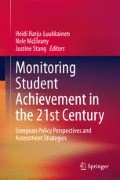Abstract
Since 1968, when it joined the International Association for the Evaluation of Educational Achievement (IEA), Hungary has participated in approximately 25 international large-scale student assessments. Participation in these assessments and the development of a national assessment system are intended to inform educational policy makers, professionals and the public. This chapter presents the history and the current state of the Hungarian assessment system with special focus on international studies and the National Assessment of Basic Competencies as its main pillars. The chapter’s main focus is on equity, a key issue in Hungarian public education, which our assessment data sheds light on. Results from PISA 2015, TIMSS 2015, PIRLS 2016 and NABC 2017 are used to explore differences between schools in terms of socio-economic status and academic achievement, as well as the strength of relationship between the former and the latter. Policy recommendations regarding assessment and the public education system as a whole are made.
Access this chapter
Tax calculation will be finalised at checkout
Purchases are for personal use only
References
2011évi CXC. törvény a nemzeti köznevelésről [Act CXC of 2011on National Public Education]. (2011). Retrieved from http://net.jogtar.hu/jr/gen/hjegy_doc.cgi?docid=A1100190.TV
Agasisti, T., Avvisati, F., Borgonovi, F., & Longobardi, S. (2018). Academic resilience: What schools and countries do to help disadvantaged students succeed in PISA (OECD education working papers, 167). Paris: OECD Publishing. https://doi.org/10.1787/e22490ac-en.
Az oktatásról. 1985. évi I. törvény. (1985). Magyar Közlöny, 19. sz., pp. 461–492.
Balázsi, I. (2016). Applying value-added models to student achievement. Magyar Pedagógia, 116(1), 3–23.
Ballér, E. (2001). Új tendenciák a tantervelméletben és a tantervfejlesztésben. Iskolakultúra, 2001(9), 67–72.
Báthory, Z. (1983). Az iskolai nevelés néhány összetevőjének vizsgálata egy felmérés tükrében (TOF-80) – Bevezető. Pedagógiai Szemle, 33(2), 135–139.
Báthory, Z. (1992). Hungarian experiences in international student achievement surveys. Prospects, 22(4), 434–440.
Berényi, E., Bajomi, I., & Neumann, E. (2013). Une expérience hongroise visant à gouverner par les nombres – genèse et évolution du Système National de Mesure des Compétences. In C. Maroy (Ed.), L’école à l’épreuve de la performance (pp. 71–88). Brussels: De Boeck Supérieur.
Brassói, S., & Kádár-Fülöp, J. (2011). How IEA influenced the education system in Hungary. In C. Papanastasiou, T. Plomp, & E. C. Papanastasiou (Eds.), IEA 1958–2008: 50 years of experiences and memories (Vol. 1, pp. 431–446). Amsterdam: The International Association for the Evaluation of Educational Achievement (IEA).
Center for Research on Learning and Instruction, University of Szeged. (n.d.). Developing diagnostic assessments. Retrieved from http://edia.hu/projekt/?q=en
Educational Authority. (2018). Kiemelkedő teljesítményű iskolák. Retrieved from https://www.oktatas.hu/kozneveles/meresek/kompetenciameres/kiemelkedo_teljesitmenyu_iskolak
Eurostat. (n.d.) Eurostat Database. Education and training outcomes. Retrieved from https://ec.europa.eu/eurostat/web/education-and-training/data/main-tables
Halász, G., & Lukács, P. (1987). Az IEA magyarországi hatása: oktatáspolitikai esettanulmány (OPI Értékelési Központ Közleményei, 14). Budapest: Országos Pedagógiai Intézet.
Hivatal, O. (2018). OKM 2017 Kutatói Adatbázis. Budapest: Oktatási Hivatal.
Hungarian Central Statistical Office. (n.d.) Population census 2011, educational data. Retreived from http://www.ksh.hu/nepszamlalas/tablak_iskolazottsag
International Association for the Evaluation of Educational Achievement. (2016). TIMSS 2015 international database. Retrieved from https://timssandpirls.bc.edu/timss2015/international-database/
International Association for the Evaluation of Educational Achievement. (2017). PIRLS 2016 international database. Retrieved from https://timssandpirls.bc.edu/pirls2016/international-database/index.html
Kádár-Fülöp, J. (2015). Nemzetközi tudásszintmérés – hazai oktatáspolitika. Education, 24(2), 9–15.
Musset, P. (2012). School choice and equity: Current policies in OECD countries and a literature review (OECD education working papers, 66). Paris: OECD Publishing. https://doi.org/10.1787/5k9fq23507vc-en.
Organisation for Economic Cooperation and Development. (2011). Against the odds: Disadvantaged students who succeed in school. Paris: OECD Publishing.
Organisation for Economic Cooperation and Development. (2014). When is competition between schools beneficial? (PISA in focus, 42). Paris: OECD Publishing. https://doi.org/10.1787/5jz0v4zzbcmv-en.
Organisation for Economic Cooperation and Development. (2016a). PISA 2015 international database. Retrieved from http://www.oecd.org/pisa/data/2015database/
Organisation for Economic Cooperation and Development. (2016b). PISA 2015 results (volume 1). Excellence and equity in education. Paris: OECD Publishing. https://doi.org/10.1787/9789264266490-en.
Ostorics, L. (2015). A tanulói teljesítménymérések jellemzői, jövőbeni irányvonalai, kritikái. In K. Széll (Ed.), Mit mér a műszer? (pp. 37–62). Budapest: Oktatáskutató és Fejlesztő Intézet.
Szabó, L. D., Szepesi, I., Takács-Kárász, J., & Vadász, C. S. (2018). Országos kompetenciamérés 2017. Országos jelentés. Budapest: Oktatási Hivatal. Retrieved from https://www.oktatas.hu/pub_bin/dload/kozoktatas/meresek/orszmer2018/Orszagos_jelentes_2017.pdf
Travers, K. J. (2011). The Second International Mathematics Study (SIMS): Intention, implementation, attainment. In C. Papanastasiou, T. Plomp, & E. C. Papanastasiou (Eds.), IEA 1958–2008: 50 years of experiences and memories (Vol. 1, pp. 431–446). Amsterdam: The International Association for the Evaluation of Educational Achievement (IEA).
Vári, P. (Ed.). (1997). Monitor ‘95. National assessment of student achievement. Budapest: Országos Közoktatási Intézet.
Vári, P., Bánfi, I., Felvégi, E., Krolopp, J., Rózsa, C., & Szalay, B. (2000). A tanulók tudásának változása I. A Monitor ‘99 felmérés előzetes eredményei. Új Pedagógiai Szemle, 50(6), 25–35.
Vári, P., Aux-Bánfi, I., Felvégi, E., Rózsa, C., & Szalay, B. (2002). Gyorsjelentés a PISA vizsgálatról. Új Pedagógiai Szemle, 52(1), 38–65.
Author information
Authors and Affiliations
Corresponding author
Editor information
Editors and Affiliations
Rights and permissions
Copyright information
© 2020 Springer Nature Switzerland AG
About this chapter
Cite this chapter
Balázsi, I., Ostorics, L. (2020). The Hungarian Educational Assessment System. In: Harju-Luukkainen, H., McElvany, N., Stang, J. (eds) Monitoring Student Achievement in the 21st Century. Springer, Cham. https://doi.org/10.1007/978-3-030-38969-7_13
Download citation
DOI: https://doi.org/10.1007/978-3-030-38969-7_13
Published:
Publisher Name: Springer, Cham
Print ISBN: 978-3-030-38968-0
Online ISBN: 978-3-030-38969-7
eBook Packages: EducationEducation (R0)

